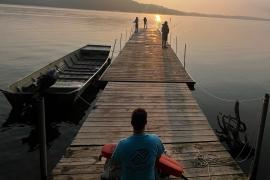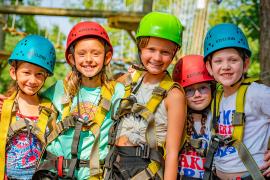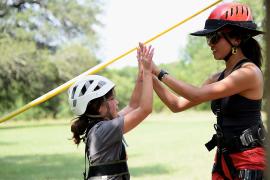Ah — the quiet of winter at camp can be just what a person needs to return to a peaceful state of mind. All too soon, however, it will be time to welcome the beautiful noisiness of campers as they flood your gates. It’s always a challenge to come out of the hibernation of the winter months, and this year will be especially hard due to the impact of the coronavirus (COVID-19). That’s why you need to start preparing now to keep your campers and employees safe—and you need to start with the basics. Here are a few examples of categories you should be thinking about when planning:
Camper Safety
- COVID-19 – Just like last year, it’s extremely hard to plan for the summer when you don’t know how widespread the virus will be. In January 2021, the Centers for Disease Control and Prevention (CDC) updated its recommendations for youth and summer camps. If you are changing your programs due to the disease, make sure your procedures and policies reflect those changes. The ACA also has a resource center for camps regarding COVID-19.
- Trees – The trees on your property may have taken a fair amount of damage over the past year. Walk your property and look for dead or dying trees in areas that campers might frequent.
- Walkways and parking lots – Freeze and thaw cycles may have damaged areas where campers and staff walk. Check for trip and fall hazards.
- Lighting – Check all lights on your property to ensure they are working correctly. Poor lighting can lead to falls.
- Smoke and carbon monoxide detectors – Remember to change batteries and check all smoke and carbon monoxide detectors throughout the camp.
- Challenge courses – Ropes and climbing courses, ziplines and other challenge courses likely are some of the most dangerous areas in your camp. Make sure you have a qualified professional perform an annual inspection of these courses and train your staff members on operation of the equipment.
- Employee screening – Be sure to perform extensive screening on all employees before allowing them to come in contact with campers.
Employee Safety
- Training programs – New employees typically have many questions, and even longtime staff may need refreshers on past best practices and new processes. Use this time to review your training programs and ensure they address new activities and protocols, as well as answer any questions new hires may have. Ensure that you maintain documentation of all employee training, and provide a consistent and thorough orientation for all employees and volunteers.
- Supplies for maintenance, custodial and housekeeping staff – All employees should have some level of personal protective equipment (PPE). But maintenance workers, in particular, need proper PPE for the many tasks they perform around the camp. Employers are required to provide and train employees on PPE, so ensure you are up to date on each department’s particular needs. Additionally, the maintenance, housekeeping and custodial departments should be trained on all cleaning agents and chemicals that they work with to ensure proper use and storage. Keep up-to-date Safety Data Sheets (SDS) on all chemicals available to those who could come in contact with them.
Property
- Wildfires – If your camp is located in an area that is prone to wildfires, you need to take the necessary precautions to protect both your property and your people. When a wildfire is spreading, it can travel from dry grass and shrubs up to treetops through low-hanging limbs. These canopy fires can spread quickly and burn out of control. All tree limbs should be pruned so they are a minimum of 6’ from the ground. Additionally, to protect camp buildings, ensure you have 5’ of defensible space around each structure that is clear from wood storage, combustible material, and dry vegetation. Last, but not least, meet with your local fire department to discuss camp access routes, hydrant locations and evacuation procedures.
- Fire suppression systems – You likely have fire extinguishers and other fire suppression systems, such as sprinkler and kitchen fire protection systems, spread throughout your property. You need to inspect each of these devices to make sure they are working properly.
- Pest control – During the off-season times, pests may have become an issue in some areas of your camp. Check for stinging insects, bats and rodents in your cabins, bathhouses and other facilities. If you find evidence of some of these pests, such as droppings, check the general structure of the building to make sure they haven’t compromised the wiring or insulation.
- Snow damage – Over the winter, snow may have made some unexpected changes to your camp property. In particular, heavy snow may have weakened roofs, which could lead to dangerous conditions by the time your camp is filled with young people. Perform a thorough inspection of all structures.
- Vandalism – It’s possible that vandals have damaged some parts of your property over the last few months, and you may not have even realized it. During your inspection, check for signs of vandalism and then make the necessary repairs.
Vehicle Safety
- Preventive maintenance - This is extremely important for all vehicles that you operate. In particular, any vehicles that have been sitting idle for several months likely will need a tune-up. Check to see if tire tread is sufficient, lights are operating and tire pressure is appropriate.
- Pest damage – Just like with buildings, rodents and other pests can cause sizable damage to your vehicles. Check for evidence of pests and perform an inspection of all the inner workings of your vehicles.
This list of tasks doesn’t begin to scratch the surface of all you need to do to prepare for the busy camper season ahead. But it’s a good place to start. Even though this year will be different than most because of the allowances you must make for safety amid a pandemic, don’t forget to attend to the basics of facility and program readiness. Remember to reach out to a trusted insurance partner to make sure your coverage is up to date and appropriate for your property and the type of program you want to run. It’s going to be a great season!
Tracy Schmeltzer has over two decades of insurance management and is currently the director of Camps and Conference Centers at Church Mutual Insurance Company, S.I. Tracy brings the understanding and experience to help mitigate the unique risks these organizations face. She is in constant communication with hundreds of camps and conference centers, getting a close look at their daily operational challenges and supporting them as they manage potential risks.
Periodically, the American Camp Association (ACA) makes timely and relevant information about products and services available to its members so they can make informed decisions for their camps. However, the ACA does not endorse products, services, or companies.
Sponsored by Church Mutual Insurance Company.
Periodically, the American Camp Association (ACA) makes timely and relevant information about products and services available to its members so they can make informed decisions for their camps. However, the ACA does not endorse products, services, or companies.
The views and opinions expressed by contributors are their own and do not necessarily reflect the views of the American Camp Association or ACA employees.




